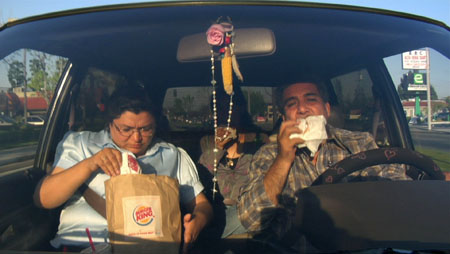
My review of Food Inc. at See. Though I still think the Onion's food issue got its point across better.
I confess to feeling more than a bit uneasy during the opening sequence of Food Inc., which features ominous-looking animated businessmen walking toward their jobs at, presumably, evil corporations. I’m partial to the film’s message, being a fan of the recent wave of food activism, spearheaded by people like Jamie Oliver and Michael Pollan and in which this film takes part, exposing the negative impact of the corn and meat industries and urging people everywhere to move away from processed foods. But at the same time, I’m a little gun-shy when it comes to “issue” documentaries in general, fearing at all times the toxic influence of Michael Moore that has turned a proud artform into the craft of douchebag polemics.
Scary businessmen aside, my worries were happily unfounded. Food Inc. has nary an overbearing personality or villainous caricature, and everyone who appears onscreen is given an honest-to-goodness fair shake. It’s a good thing, too: this is far too important an issue to be tackled by the likes of Morgan Spurlock. Food Inc. is not a film that alienates people by making fun of “fat Americans,” nor a left-wing echo chamber calling for socialist takeover. Its argument cuts across social, political, and class boundaries, featuring Republican families fighting for the safety of their children, undocumented workers being exploited by factory farms and slaughter plants, and lower-class “obese” Americans whose minimum-wage jobs leave them dependent on cheap processed foods. Director Robert Kenner deserves a lot of praise simply for discussing the problem of food consumerism while avoiding any trace of the sneering classism all too often directed at Wal-Mart shoppers. Even Wal-Mart itself is given the time of day, and comes off looking better as a result.
Overall, Kenner provides a simple, straightforward documentary that’s interested mostly in providing information and letting its subjects talk. The message comes through loud and clear, but it’s presented as something inclusive, stressing that “how we eat,” and the nastiness of factory farming and processed foods, are problems that affect all of us, be it in terms of health, worker safety, the environment, or simple culinary taste. Conscientious consumerism and political action on food are not inherently divisive issues; Kenner recognizes that there is a genuine possibility for consensus-building here. (Hell, what cause could better unite organic-farming hippies and free-trading market economists than ending corn subsidies?)
But don’t let all this nice talk fool you: the film is every bit disturbing as it is elucidating. It’ll surely ruin your appetite for the next week or so as it documents the troubling change food has undergone over the past 40 years, from whole foods into unrecognizable manufactured products. Food Inc. will make it difficult for you to sit down for a meal without first considering the chickens bred and force-fed into such an unnatural state that they can no longer support their own body weight, or feedlot cattle packed shoulder to shoulder for months on end, being fed processed corn and meat by-products as they stand knee-deep in feces.
None of this will be news to readers of Michael Pollan and Eric Schlosser, who both appear in the film and whose books (Pollan’s The Omnivore’s Dilemma and In Defense of Food, and Schlosser’s Fast Food Nation) provide its intellectual backbone. In that respect, the film itself provides little in its own right, and there are times when Food Inc. comes across — if you’ll forgive the metaphor — as a fast food version of the material on which it is based. It repeats the findings of journalists, but never manages to become investigative journalism itself.
And it is perhaps because I find the information presented in Food Inc. to be so important that I am disappointed it does not deal with some of the easier objections to its
argument. I’m sure we’ve all heard these things at various social gatherings: How is organic farming supposed to feed billions of people? What about the hungry people GMOs could help us feed? How am I supposed to afford a three-dollar banana at the local organic food store, anyway? It’s entirely possible that these are answerable questions, but I wouldn’t know, as Food Inc. just never addresses them.
Perhaps that’s expecting too much, though. Food Inc. isn’t here to solve all of the food industry’s problems, it’s here to shed some light on a very important issue and stir up some dialogue, making it essential viewing regardless. And if all it manages to accomplish is bring the work of Pollan and Schlosser to a new audience, all the power to it.
No comments:
Post a Comment